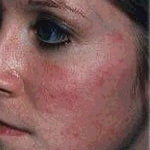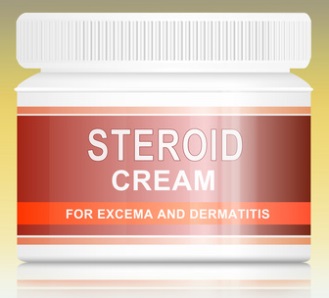
Steroid-induced rosacea refers to rosacea or rosacea-like symptoms that develop after the use of corticosteroid medications, like prednisone, cortisone, and hydrocortisone. Steroids are not the only cause of rosacea symptoms. Numerous other things can trigger symptoms, including other types of medications, such as some blood pressure medicines. You should be aware of the possibility of rosacea triggered by steroid use, however, especially if you have had symptoms of rosacea in the past or if you have a family history of the condition.
Note that we are talking here about corticosteroids, which are prescribed to treat various medical conditions, not anabolic steroids, which are the kind sometimes used by athletes to enhance their performance. Anabolic steroids can cause numerous harmful side effects, but they are not known to be a trigger of rosacea or rosacea-like symptoms.
What Causes Steroid Rosacea?

Steroid-induced rosacea can be triggered by oral steroids, often prescribed for inflammatory conditions like osteoarthritis, rheumatoid arthritis, and lupus, as well as by topical steroid creams, often prescribed for skin disorders and rashes. If you have rosacea, taking steroids may cause your symptoms to flare up. If you haven’t been diagnosed with rosacea in the past, taking steroids may, in some cases, trigger the development of rosacea or rosacea-like symptoms. This is more common in people that use topical steroid medications, like those prescribed to treat rashes, but oral steroids can also cause it.
If you have rosacea, make sure you let your doctor know before you take any steroid medications. You might want to ask if there are any alternatives to steroids that you could take instead. If you develop rosacea-like symptoms while taking steroid medications, contact your doctor. Don’t just stop taking any prescribed medications without consulting your doctor first, though.
How is Steroid Induced Rosacea Treated?
According to the National Rosacea Society, steroid rosacea usually goes away when you stop using steroid medications. Again, though, you should not stop taking any prescribed drugs without talking to your doctor first. There may be other medications you can take that will be less likely to cause rosacea or rosacea-like symptoms, but in some cases, the benefits of taking steroids may outweigh the risks.
If you need to continue taking steroid medication even though it causes rosacea symptoms, or if you’ve discontinued the steroids but are still dealing with their effects, there are treatments available that can help relieve your symptoms. Doctors sometimes recommend antibiotics to treat acne-like symptoms, or if those don’t work or symptoms are severe, they may recommend an acne medication like isotretinoin (Sotret, Claravis, Amnesteem). While these medications are often effective, they do carry the risk of side effects, some of them potentially serious. Discuss any concerns about side effects with your physician. Note that isotretinoin is not recommended if you are pregnant or may become pregnant.
Natural Treatments For Steroid Induced Rosacea
Many people prefer to try natural treatments for rosacea, whether the condition is triggered by steroids or not because they want to avoid the possible side effects of prescription medications used to treat the disorder. We like the Skin Support System from Zenmed, which includes an anti-redness mask, support serum, a gentle cleansing cream for dry skin, and a facial cleansing gel for oily skin, all made from natural botanical ingredients like licorice root extract (to reduce redness and inflammation), tea tree oil (to treat the acne-like bumps), green tea extract (to reduce redness and irritation), cucumber (to reduce redness and irritation) and lavender (to soothe and heal damaged skin). The unique combination of ingredients effectively treats rosacea symptoms while soothing sensitive skin. To learn more about our favorite natural treatment for steroid rosacea, just follow this link to the Zenmed Website.
National Rosacea Society: Steroid Induced Rosacea
